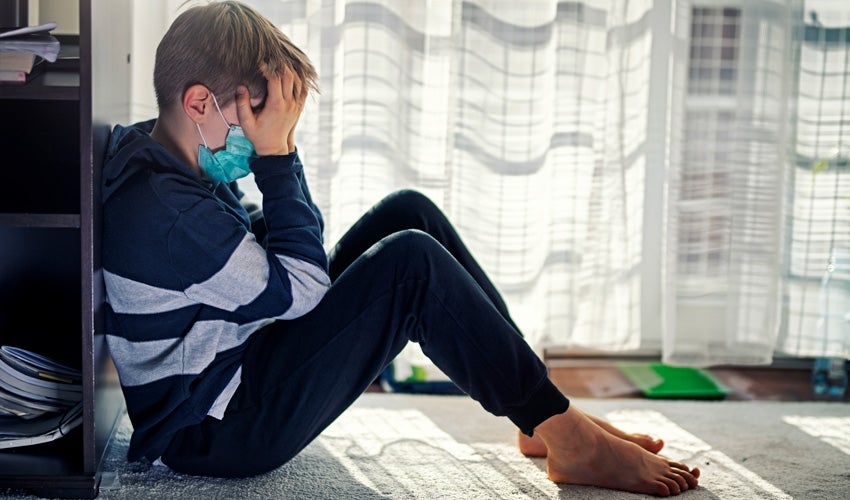Greater focus needed on kids during pandemic

Since lockdown restrictions were introduced in March, the national 24/7 counselling and support service Kids Helpline has received a significant increase in the volume of children and young people seeking help, up 24% to the end of August compared to 2019.
The concerns they raised in counselling sessions provide important insights into how governments, parents and educators can better support children and young people through the pandemic.
A report published today by the Australian Human Rights Commission and yourtown, which runs Kids Helpline, analyses data from 2,567 counselling sessions in which children and young people aged five to 25 discussed the impacts of COVID-19 on their lives. It also calls on governments to prioritise children and young people in their road to recovery plans.
The report is unique because it is not based on surveys or expert opinion, but on the lived experiences of children and young people seeking help during the pandemic – and its recommendations relate directly to their concerns.
Mental health was the most common issue, with nearly a third describing it as a concern. They spoke about feelings of worry and stress, being trapped or frustrated, and feeling anger, sadness, loss and grief.
Many of the children and young people who contacted Kids Helpline spoke about the impact of COVID-19 on pre-existing mental health conditions, including anxiety and depression, phobias, eating disorders, obsessive and compulsive behaviours, intrusive thoughts, self-harm and suicidality, to name a few.
‘Julia’, aged 17, told Kids Helpline she already had a fear of germs and compulsively washed her hands, and Coronavirus triggered this anxiety enormously. She would only eat packet foods and sometimes wouldn’t eat anything at all. She was aware her thoughts were unreasonable but found them impossible to control with her usual distractions being so limited.
Children and young people with pre-existing conditions, including mental health issues and disability, are at far greater risk of being negatively impacted by the pandemic, and require extra support and attention. It is vital that support services are available, and well-resourced to ensure the most vulnerable children do not fall through the cracks.
The second most common concern among children and young people who contacted Kids Helpline was social isolation, with a fifth raising this as an impact on their lives. Teenagers especially felt that friends provided their main mental health support in times of crisis and were worried about being unable to connect with them.
School is an important place for children and young people to socialise, and many said they missed seeing their friends. This was not only confined to younger ages. University students also lamented the loss of social connection usually provided by attending classes and campuses in person.
The third major impact children and young people spoke about was on education, with 20% saying they struggled with changes to their learning environment. Many had difficulties with remote learning. High school children particularly felt overwhelmed with the volume of work assigned to them, while children and young people across all age groups mentioned boredom, and having too many distractions at home.
This underscores the need for schools to be well supported in delivering quality online learning that engages students as effectively as possible. There is also a need to maintain help and connection for vulnerable students should remote learning be required.
Children and young people frequently discussed the impact of lockdown on family life, with 19% saying this affected them – although not always negatively, since a minority valued spending more time with their families.
Young people often spoke about increased family tensions due to living so closely together or financial stress. Some spoke of parents who had lost work, a lack of nutritious food in the house, and parents whose drinking had increased. Their experience dramatically underlines the need to extend economic support to all families who need it.
‘Eddie’, aged 14, told Kids Helpline that things had been bad at home since Coronavirus. His dad lost his job, and both his parents had been drinking every night and spending their money on cigarettes and alcohol instead of proper food.
Young people also spoke about the impact of having to change their plans and activities, with 14% identifying this as an issue. Many said activities such as sport, dance classes, or going to gyms or clubs were their usual way of dealing with mental health issues, and they struggled once these were suspended. They also discussed disappointment at missing rite-of-passage events like birthday celebrations or travel plans.
Children and young people are particularly susceptible to the impacts of COVID-19 since they rely on parents, schools and friends for support. The concerns they raised with Kids Helpline highlight the need for appropriate supports for families experiencing hardship, and for schools delivering remote learning.
Above all, the mental health concerns young people raised show governments must ensure there is sustained investment in mental health and other services for children and young people, and build greater capacity to support children experiencing stress, anxiety and depression – not only during COVID-19 but also beyond the pandemic.
